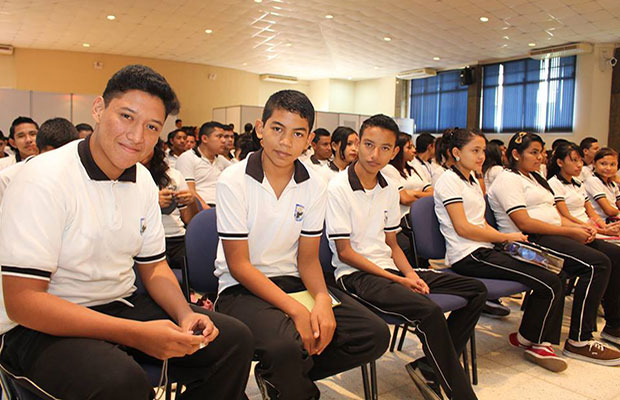
Empowering Youth Through Education
In El Salvador, violence and crime have soared to such an alarming degree that an estimated 60,000 youth are involved in some form of gang activity—the heartbreaking, and seemingly intractable, legacy of the country’s brutal civil war. In response, Salesian missionaries are working hard to erase the root causes of despair…starting with education.
The need for education remains critically high today. Close to 35 percent of El Salvador’s population lives in poverty. According to the U.S. Agency for International Development (USAID), fewer than 50 percent of children graduate from the sixth grade; only one out of three students finishes the ninth grade; and only one out of five completes high school. With few opportunities to go to school or succeed in the classroom, young people between the ages of 15-24 face staggering levels of unemployment—which leaves them particularly vulnerable to delinquency, substance abuse and the false promises of gangs. Combined with the ongoing daily stress of living in one of Central America’s most violent countries, young men and women born into these conditions have little hope for escape.
“Years ago, Salesian missionaries realized that young people in El Salvador needed a solid support system, and better access to education, in order to cope with their emotional traumas and overcome the poverty that leads to—and results from—violent conflict,” says Father Gus Baek, director of Salesian Missions.
In 1985, Fr. José María Moratalla Escuerdos proposed building a technical school in one of San Salvador’s most destitute areas. With input from local youth, who requested workshops where they could learn and practice trades in their own community, he and his fellow missionaries established the Don Bosco Industrial Polygon (Polígono Industrial Don Bosco). Today, what once was literally a garbage dump is now a place of entrepreneurship and hope. The complex includes primary, secondary and technical schools; a daycare center; and recreational facilities. Don Bosco Industrial Polygon primarily serves at-risk youth from low-income families; its programs successfully rehabilitate, educate and help mainstream former street children, gang members and juvenile offenders.
“Rather than getting caught up in crime, substance abuse and violence, participants at the Don Bosco Industrial Polygon are learning in-demand trades and setting up micro-businesses in order to support themselves and improve their communities,” says Fr. Gus. “And the model is a creative solution because by having these training schools close to businesses in need of skilled labor, students see how education can lead directly to employment. This even motivates the younger students to stay in school because they become excited for what the future can hold.”
Don Bosco Industrial Polygon is just one of many innovative and ongoing projects offered by missionaries throughout the country. The Salesian-run Fundación Salvador del Mundo (FUSALMO), for example, serves vulnerable children and youth in the cities of San Miguel, Santa Ana and Soyapango, which are struggling with high levels of gang violence. Through traditional and non-traditional educational opportunities—including recreational programs, enrichment opportunities in the arts and music, vocational training and more—FUSALMO encourages at-risk youth to stay off the streets, learn to cooperate and co-exist, and gain the skills they need to become productive, contributing members of a more peaceful society. Founded in 2001, the organization has already positively impacted the lives of more than 265,000 children and their families.
Through educational programs, Salesian missionaries are empowering youth in El Salvador and around the world to create their own opportunities for success now and later in life. Innovation as well as student input and involvement over the years have resulted in exceptional programs that are enabling young people to overcome poverty and realize their full potential.
Our mission empowers at-risk youth in places where it is needed the most. What’s your mission?
Learn more about our work in El Salvador.

